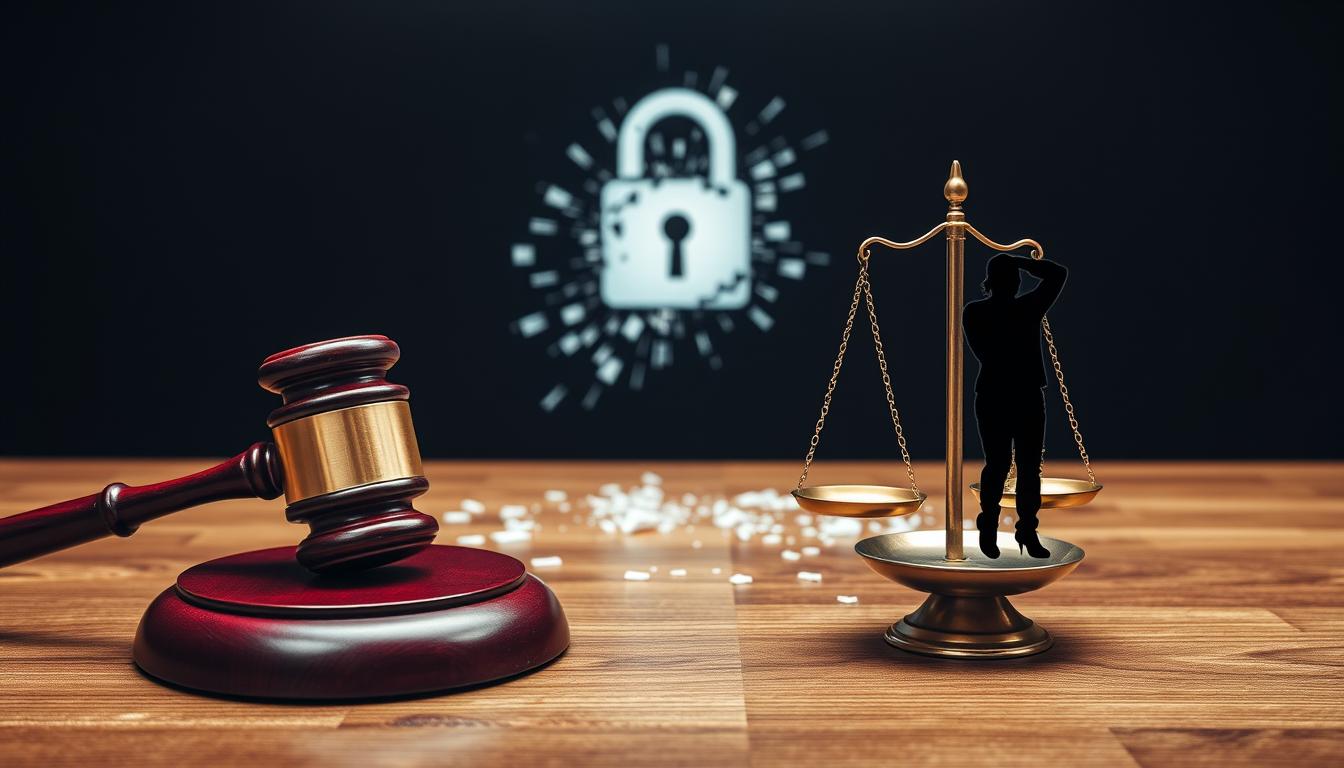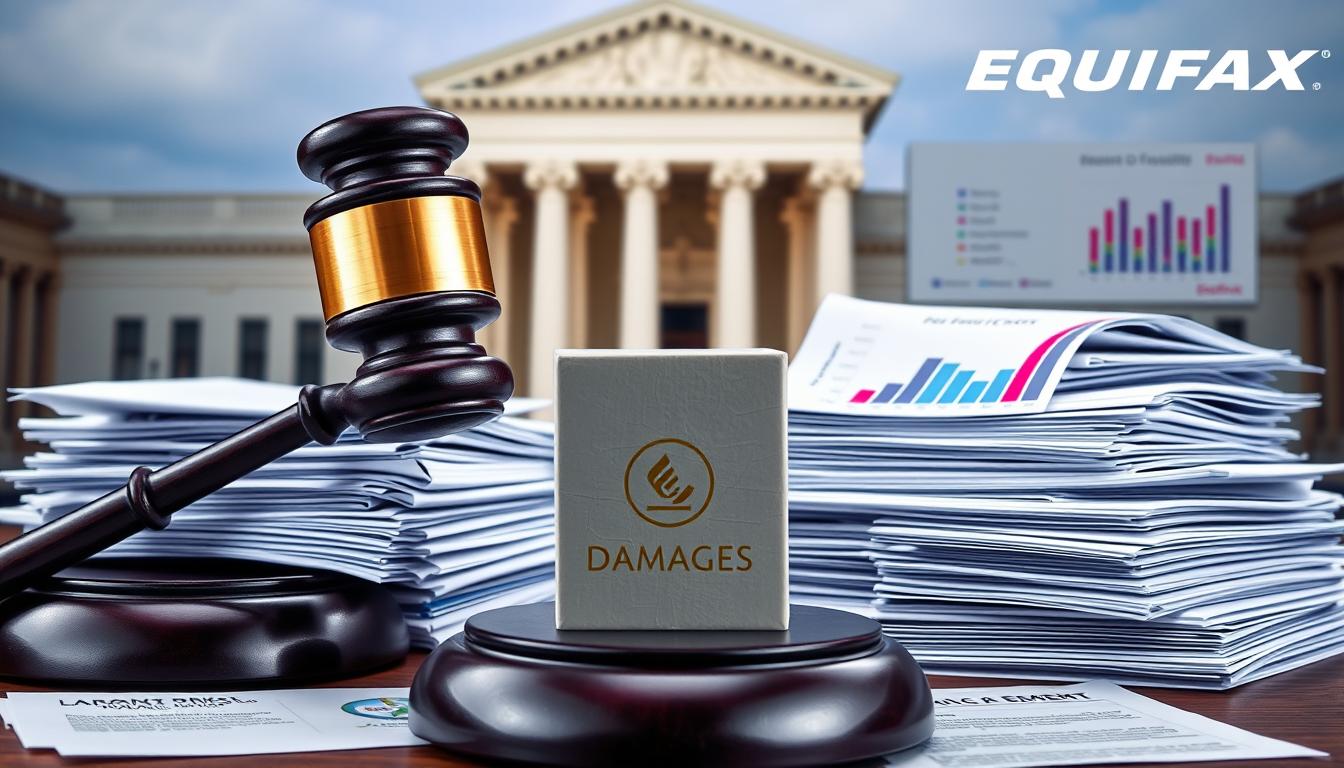Have you been affected by the Equifax data breach? Are there errors in your credit report? You might be considering legal action against Equifax. This guide explains your options for suing Equifax and the steps involved.
We’ll cover potential legal claims, grounds for suing, and possible damages. We’ll also discuss alternatives like credit monitoring and identity theft protection services.
Key Takeaways
- Equifax is a major credit reporting agency with legal obligations to protect consumer data and provide accurate credit reports.
- You may have grounds to sue Equifax if you’ve been a victim of the Equifax data breach or faced inaccuracies in your credit report.
- The process of suing Equifax involves gathering evidence, choosing the right legal representation, and understanding the potential legal claims and grounds for suing.
- Joining a class-action lawsuit against Equifax is an option if you’ve been affected by the data breach.
- Alternatives to suing Equifax include credit monitoring and identity theft protection services.
Understanding Equifax’s Role and Responsibilities
Equifax is a major credit reporting agency in the United States. It collects and manages financial data for millions of people. This information helps lenders and employers make important decisions about individuals.
Equifax: A Major Credit Reporting Agency
Equifax gathers detailed financial information on countless individuals. This includes credit reports, credit scores, and payment histories. Organizations use this data to assess people’s creditworthiness and financial status.
Legal Obligations and Consumer Rights
- Equifax is legally required to ensure the accuracy of the information it reports on consumers’ credit reports.
- The company must also protect consumer data from unauthorized access, breaches, and misuse.
- Consumers have the right to dispute any inaccuracies they find on their Equifax credit reports and have them corrected in a timely manner.
- Equifax must also adhere to the Fair Credit Reporting Act (FCRA), which outlines the company’s legal obligations and consumer rights.
Knowing Equifax’s role is vital for safeguarding your financial health. It helps ensure your credit reports are correct and secure. This knowledge empowers you to protect your financial well-being.
Reasons to Sue Equifax
Consumers may consider suing Equifax for two main reasons. First, data breaches can lead to identity theft. Second, errors on credit reports can cause significant problems.
Data Breaches and Identity Theft
The 2017 Equifax data breach exposed millions of Americans’ personal information. This left many vulnerable to identity theft and financial crimes. Victims may sue Equifax for failing to protect their data.
Damages from this breach can include fraudulent charges and ruined credit. Victims also spend time and money resolving identity theft issues.
Credit Report Errors and Inaccuracies
Inaccurate credit reports can lead to loan and credit card denials. They may even affect employment opportunities. Consumers have the right to dispute errors on their Equifax reports.
If Equifax fails to correct these issues promptly, they may be liable. Individuals facing financial problems due to inaccurate reports may consider legal action.
| Reason to Sue Equifax | Potential Damages |
|---|---|
| Data Breach and Identity Theft | Fraudulent charges, ruined credit, time and resources to resolve identity theft |
| Credit Report Errors and Inaccuracies | Denials for loans, credit cards, or employment, financial and credit-related problems |
These reasons highlight why consumers might sue Equifax. Understanding your options can help you hold Equifax accountable. You may also seek compensation for damages caused.

How Can I Sue Equifax
Equifax’s data breach or credit report errors may have affected you. You might be considering legal action against them. With the right approach, you can seek justice and hold Equifax accountable.
Start by gathering evidence to support your case. Collect records of the data breach and copies of your credit report. Include any correspondence you’ve had with Equifax about the issue.
Choosing the right legal representation is crucial. A lawsuit against a large corporation can be complex. An experienced attorney can guide you through the process.
- Gather all relevant evidence and documentation, such as:
- Records of the Equifax data breach
- Copies of your credit report
- Correspondence with Equifax
- Research and select a reputable attorney or law firm with experience in how can i sue equifax and equifax lawsuit cases.
- Understand the legal process and your potential grounds for suing Equifax, such as data breaches, identity theft, or credit report errors.
- Be prepared to provide detailed information and documentation to your legal representative to strengthen your equifax lawsuit.
Suing Equifax may seem tough, but it’s possible with the right strategy. You can seek justice and maybe get compensation for your damages.
Focus on gathering evidence and understanding your rights. Choose the right legal team to support you throughout the process.
| Step | Description |
|---|---|
| Gather Evidence | Collect records, documents, and other materials that support your case against Equifax. |
| Retain Legal Counsel | Hire an experienced attorney or law firm to represent you in your how can i sue equifax lawsuit. |
| Understand Legal Grounds | Determine the specific legal claims and grounds for your equifax lawsuit, such as data breaches or credit report errors. |
| Provide Documentation | Work closely with your legal team to supply all necessary information and evidence to strengthen your case. |
“Taking legal action against a company like Equifax can be complex, but it’s important to stand up for your rights and hold them accountable for their actions.”
Filing a Lawsuit Against Equifax
Equifax’s negligence can lead to identity theft or credit report errors. Legal action might be your best option. This process involves key steps like gathering evidence and choosing the right legal representation.
Gathering Evidence and Documentation
Strong evidence is crucial for a successful lawsuit against Equifax. Get copies of your Equifax credit reports and related correspondence. Include any records from the equifax credit dispute process.
Collect proof of identity theft, financial harm, or credit report errors. Organize these documents carefully. They’ll show how Equifax’s actions affected your finances.
Choosing the Right Legal Representation
The legal system can be complex. It’s vital to have experienced lawyers on your side. Look for attorneys with success in consumer protection and credit reporting cases.
These experts can guide you on the best legal strategies. They’ll ensure your rights are protected throughout your equifax lawsuit or equifax legal action.
A successful equifax lawsuit needs thorough documentation and skilled legal help. These steps can boost your chances of getting justice and compensation.

Potential Legal Claims and Grounds for Suing
Consumers have several options for legal action against Equifax. The equifax lawsuit, equifax legal action, and equifax data breach lawsuit can be based on various legal theories. Each theory has its own requirements and potential outcomes.
One main legal avenue is the Fair Credit Reporting Act (FCRA) violation. This federal law governs consumer credit information handling. Equifax must comply with FCRA as a credit reporting agency.
Consumers may sue Equifax for FCRA violations. These include failing to fix credit report errors or improperly sharing consumer data.
The Federal Trade Commission (FTC) Act also provides grounds for legal action. Various state consumer protection laws can be used too. These laws ban unfair or deceptive business practices.
Consumers might argue that Equifax’s data breach mishandling falls under these categories. This could strengthen their case against the company.
| Legal Claim | Potential Grounds |
|---|---|
| Fair Credit Reporting Act (FCRA) Violations |
|
| Federal Trade Commission (FTC) Act and State Consumer Protection Laws |
|
Legal claims against Equifax may differ based on individual situations. State and federal laws can affect the case too. Seeking advice from a qualified attorney is crucial.
A lawyer can help explore options and create the best legal strategy. This ensures consumers have the strongest case possible against Equifax.
Equifax Data Breach Lawsuits
The 2017 Equifax data breach exposed personal info of over 147 million Americans. It was a major cybersecurity incident. Consumers seek legal action through class-action lawsuits against the credit reporting agency.
Understanding the Equifax Data Breach
A website vulnerability led to the Equifax data breach. Hackers accessed names, Social Security numbers, birth dates, addresses, and credit card info. This sensitive data was reportedly sold on the dark web.
The breach put victims at high risk of identity theft and financial fraud. Millions of Americans faced potential financial ruin.
Joining a Class-Action Lawsuit
- Affected consumers can join class-action lawsuits against Equifax. They seek compensation for damages suffered due to the breach.
- Lawsuits claim Equifax failed to protect data and respond effectively. This negligence put millions at risk of identity theft.
- Joining a lawsuit may lead to settlement shares and protection services. Equifax offers credit monitoring and identity theft protection.
Consider your legal options if you were affected by the Equifax breach. Joining a class-action lawsuit can help protect your rights. You may receive compensation for damages caused by the data breach.
| Equifax Data Breach Lawsuits | Equifax Identity Theft Protection | Equifax Credit Monitoring Services |
|---|---|---|
| Consumers can join class-action lawsuits against Equifax for failing to protect their personal data. | Equifax offers identity theft protection services to help consumers monitor their credit and protect against fraud. | Equifax provides credit monitoring services to help consumers track their credit reports and spot any suspicious activity. |

“The Equifax data breach was a massive violation of consumer trust and a wake-up call for the need to strengthen data security and privacy protections.”
Credit Reporting and Dispute Resolution
Grasping credit reporting and your dispute rights is vital. It helps fight equifax credit report errors and equifax credit score inaccuracies. You can act to ensure your Equifax report accurately reflects your finances.
Disputing Inaccurate Information
The equifax credit dispute process lets you fix errors on your credit report. This includes mistakes in personal details, account info, or fraud. By following steps, you can dispute with Equifax and possibly boost your score.
- Obtain a copy of your Equifax credit report and carefully review it for any discrepancies.
- Gather supporting documentation, such as payment records or account statements, to substantiate your claim.
- Submit a written dispute to Equifax, either online, by mail, or by phone, detailing the specific errors and providing the necessary evidence.
- Equifax is required to investigate your dispute and respond within a reasonable timeframe, typically 30-45 days.
- If Equifax confirms the information is inaccurate, they must correct it on your credit report.
You have the right to hold Equifax accountable for accurate credit reports. If they fail to address your dispute, you may pursue legal action.
This applies if they keep reporting wrong info about equifax credit report errors.
“Taking control of your credit report starts with understanding your rights and taking action to dispute any inaccuracies. Don’t let Equifax’s mistakes impact your financial well-being.”
Damages and Compensation You Can Seek
Winning an Equifax lawsuit can lead to various types of compensation. You might recover monetary damages for financial losses and emotional distress. In some cases, punitive damages and non-monetary relief are possible too.
Your potential compensation depends on your case details and legal claims. Equifax lawsuit and equifax legal action cases often involve specific types of damages.
- Reimbursement for out-of-pocket expenses related to the equifax data breach, such as credit monitoring costs.
- Compensation for lost time spent dealing with the breach’s aftermath, including filing disputes.
- Damages for emotional distress, like anxiety and stress resulting from the breach.
- Punitive damages to punish Equifax for negligent behavior and prevent future incidents.
Non-monetary relief options are also available in some cases. These can include credit report corrections and free identity protection services.
- Correction of inaccurate information in your credit report.
- Free access to credit monitoring and identity theft protection services.
- Injunctive relief, requiring Equifax to implement stronger data security measures.
Your potential recovery depends on your case’s specifics and evidence strength. An experienced equifax lawsuit attorney can help navigate the legal process effectively.

| Type of Damages | Description | Examples |
|---|---|---|
| Monetary Damages | Financial compensation for quantifiable losses |
|
| Emotional Distress Damages | Compensation for mental anguish and suffering |
|
| Punitive Damages | Punishment for the defendant’s negligent or reckless behavior |
|
| Non-Monetary Relief | Equitable remedies, not financial compensation |
|
Alternatives to Suing Equifax
Legal action against Equifax isn’t the only option for consumers. Equifax credit monitoring services and equifax identity theft protection can help reduce risks from data breaches and credit report errors.
Credit Monitoring and Identity Theft Protection
These services offer protection for consumers affected by Equifax’s data breaches. They also help those worried about identity theft. These services come with several useful features.
- Regular monitoring of your credit reports from the three major credit bureaus (Equifax, Experian, and TransUnion)
- Alerts for any suspicious activity or changes to your credit profile
- Assistance with identity theft resolution and restoration of your credit profile
- Insurance coverage to help cover the costs associated with identity theft
Enrolling in these services helps protect you from Equifax’s failures. They offer peace of mind and streamlined credit and identity protection. While they may not compensate like a lawsuit, they provide valuable safeguards.
Protecting your credit and identity is crucial in today’s digital age, and credit monitoring and identity theft protection services can be an effective alternative to seeking legal action against Equifax.”
Research different equifax credit monitoring services and equifax identity theft protection options carefully. Find one that fits your needs and budget. Taking proactive steps can reduce risks and stress from Equifax’s shortcomings.
Conclusion
Suing Equifax is possible for those affected by data breaches, credit report errors, or identity theft. You can pursue a lawsuit against Equifax, join a class-action lawsuit, or explore other solutions. It’s crucial to know your legal rights and protect your finances.
Stay informed and gather evidence to navigate Equifax lawsuits and Equifax legal action. Seek guidance from experienced lawyers to get the justice and compensation you deserve. Your personal data and financial security are worth protecting.
The choice to sue Equifax depends on your situation and the harm you’ve faced. By taking action, you can hold Equifax accountable and work towards a more secure future.

